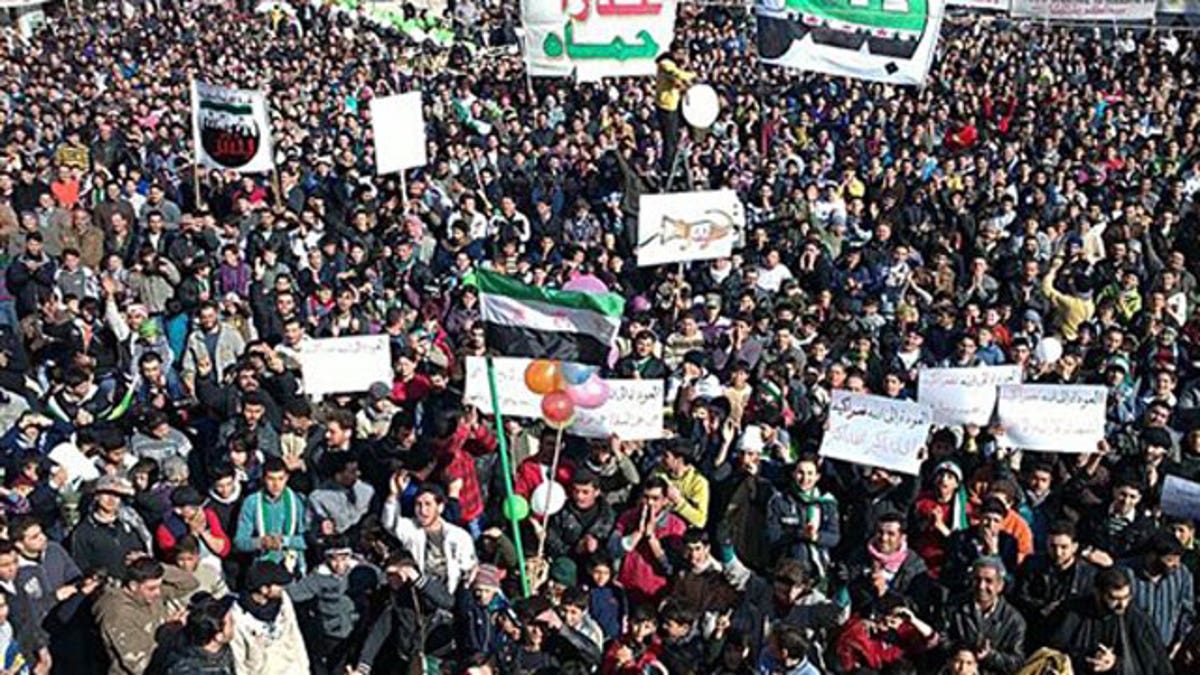
In this citizen journalism image provided by the Local Coordination Committees in Syria and released Friday, Feb. 3, 2012, anti-Syrian regime protesters march in Bensh, Idlib Province, northern Syria. (AP/Local Coordination Committees in Syria)
MUNICH – Moscow still sees two problems of "crucial importance" with a draft U.N. resolution on the violence in Syria, Russia's foreign minister said Saturday amid Western attempts to head off a Russian veto in the Security Council.
Sergey Lavrov said the resolution makes too few demands of armed groups opposing President Bashar Assad's regime. He also said Moscow remains concerned about whether it prejudges the outcome of a national dialogue among political forces in Syria.
Lavrov's comments at the Munich Security Conference came hours before the U.N. Security Council is expected to meet to consider the resolution.
He later met U.S. Secretary of State Hillary Rodham Clinton on the sidelines of the conference. The pair smiled and posed for photos in front of Russian and U.S. flags, but made no comment ahead of their meeting.
Russia is opposing any U.N. call for regime change or a military intervention in Syria, its last remaining ally in the region.
The latest version of the resolution resolves "quite a number of things which were important to us," Lavrov said. He added, however, that there were the two issues which "we would like to modify but they are of crucial importance."
"We are not friends or allies of President Assad," he said. "We try to stick to our responsibilities as permanent members of the Security Council, and the Security Council by definition does not engage in domestic affairs of member states."
"While we're all concerned with the rule of law and human rights and democracy, let's not forget that rule of law must prevail in international relations as well," he said. "When we see a veto, it's the (U.N.) charter at work."
In an interview broadcast earlier Saturday on Russian state television, Lavrov delivered a blunt warning that Moscow is prepared to use its veto power.
He said Moscow had submitted its amendments to the Western-backed draft. He said that Russia hopes that "bias will not prevail over common sense."
"If they want another scandal at the U.N. Security Council, we wouldn't be able to stop them," Lavrov said, voicing hope that Washington wouldn't put the draft to vote.
Russia and China have blocked previous Western attempts to impose sanctions on Syrian President Bashar Assad's regime over its crackdown on protests. The U.N. has said that more than 5,400 people have been killed in violence since March. Hundreds more have been killed since that tally was announced, and activists say 200 died in the city of Homs on Saturday.
The U.S. and its partners have ruled out military action but want the U.N. body to endorse an Arab League plan that calls on Assad to hand power over to Syria's vice president.
Clinton spoke with Lavrov by phone on Friday. Earlier on Saturday, she told the conference she was hopeful that the U.N. would be able to come to an agreement later in the day.
"As a tyrant in Damascus brutalizes his own people, America and Europe stand shoulder to shoulder," she said.
"We are united, alongside the Arab League, in demanding an end to the bloodshed and a democratic future for Syria. And we are hopeful that at 10 a.m. Eastern Standard Time in New York the Security Council will express the will of the international community."








































